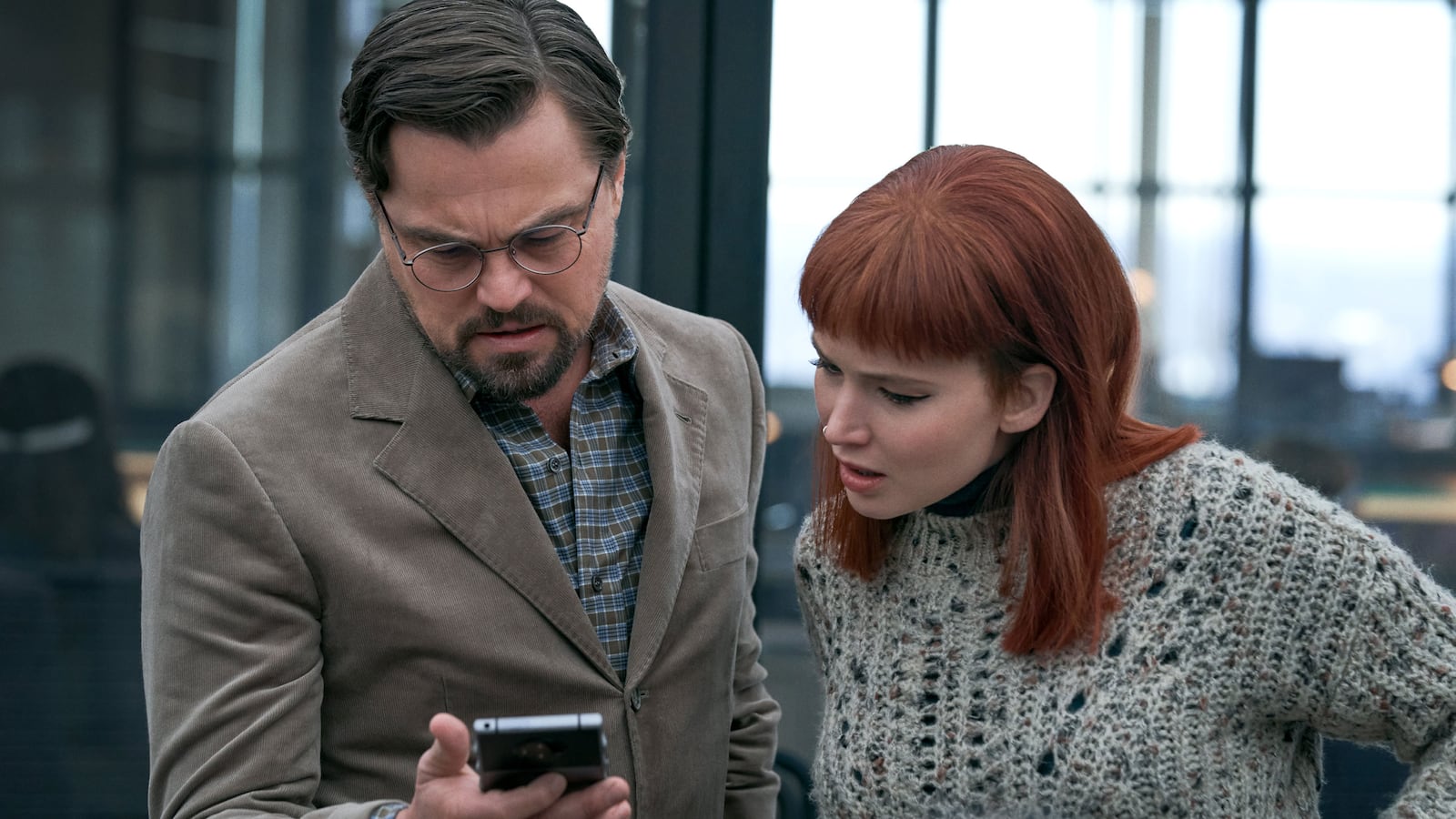Kevin: Well, if there’s one thing that could distract a nation from whether or not a Peloton bike killed a beloved TV character, it’s an asteroid hurtling toward Earth that will absolutely destroy the entire planet upon impact.
Marlow: Like Armageddon… with less laughs!
Kevin: The new movie Don’t Look Up, from Vice and The Big Short director Adam McKay, hit theaters this weekend, ahead of its Netflix release on Dec. 24. It stars every actor there is in Hollywood. No one left unbooked! Jennifer Lawrence, Leonardo DiCaprio, Meryl Streep, Cate Blanchett, Tyler Perry, Jonah Hill, um… Ariana Grande? It also features every talking point in America: the poison brain of Fox News, anti-science rhetoric, political cynicism, performative wokeness, catastrophe reax, celebrity culture, the domination of viral media, and, um… certain death? This is also a movie that has been nominated for a massive haul of awards already: National Board of Review, American Film Institute, Critics Choice and Golden Globes Best Picture among them. Yet, a huge swath of people hate this movie. I am not among them. But I venture you are. What’s with this dissonance?
Marlow: I think your feelings toward Don’t Look Up depend on how much you dig McKay’s unsubtle, hit-you-over-the-head-with-a-sledgehammer approach to “topical comedy.” Here, he’s aiming for a lightning-fast political and media farce in the vein of a more high concept In the Loop—a symphony of dysfunction—but has swapped out the curse-happy banter for one pseudo-clever slice of cultural commentary after another. The film centers on Kate (Lawrence), a doctoral student in astronomy who discovers a comet heading directly toward Earth, and her professor, Dr. Randall Mindy (Leonardo DiCaprio).
Kevin: They keep calling him “Dr. Mindy” in the movie and every time I thought they were talking about Mindy Kaling’s character on The Mindy Project. That is neither here nor there, and yet very important to note.
Marlow: Ha! So, the duo must convince the U.S. President Janie Orlean (Streep) and her creepily servile son/chief of staff (Jonah Hill) that the threat is real, which takes some convincing given they’re anti-science buffoons in the Trump mold. Kate has nose rings, Dragon Tattoo bangs, raps along to the Wu-Tang and is desperate to inform the public, so she becomes a social pariah, while Dr. Mindy, the schlubby, comparatively composed—really, meek—man with a wandering eye and low self-esteem, is branded an AILF (“Astronomer I’d Like to Fuck”). This is all supposed to be witty commentary on The State of Things.
Kevin: Here’s the thing, though: I loathed Vice, something you and I agree on.
Marlow: We definitely do. (You can read more about it here.)
Kevin: The cheeky breaking of the fourth wall in The Big Short wore out its welcome the 750th time they did it. So I went into Don’t Look Up expecting to be exasperated, and, in some respects, was. This is, as you say, a very Adam McKay film.
Marlow: I still think about that scene in Vice where the powers that be are huddled together in a fancy beltway restaurant reading through descriptions of torture on a menu. It’s a bit dripping with smug self-satisfaction and quite emblematic of McKay’s approach here as well.
Kevin: But I do think there is something to be said about his approach being applied to an American crisis happening in real time, as opposed to his previous period pieces, which tended to be more smug. I think we all are operating in a glassy-eyed, frozen-smile mode of surreality: “This can’t be actually happening/There’s no way this is real life/What’s next? A comet will hit the Earth?” How many times have we seen a news report about a meteor heading our way tweeted with captions like, “Finally.” Or, “Come and get us, King.” It’s gratifying to see that distilled, albeit for laughs, in Don’t Look Up. But also to see the bluff called: Yes, the end of all this depravity, lunacy, and mayhem will actually be the comet that comes to kill us all. Here we are in this downward spiral plummeting through a seemingly bottomless rabbit hole. There’s this nihilistic suspicion that we’ll never wake up. That we’ll never think straight again and be able to stop it. You’d think a cataclysmic event like a planet-destroying comet that there is an opportunity to thwart, provided we start thinking rationally again, would be enough to jolt us out of it. And yet…
Marlow: You mentioned “laughs” but there were precious few to be found here. The only person to coax a few chuckles out of me in the film was Ariana Grande, who turns in one of its better performances as an opportunistic pop star challenging the administration’s ignorance with her hit single “Just Look Up,” a nod to an online social justice movement of sorts.
Kevin: “Oscar-winner Ariana Grande.” Nothing has sounded more absurd, or more right.
Marlow: I wouldn’t go that far! Don’t Look Up is mostly devoid of jokes, instead relying on heightened scenarios to do the comedy heavy-lifting, e.g. a relentlessly upbeat morning show hosted by Cate Blanchett and Tyler Perry, or a $300 million action film based on the real-life tragedy unfolding starring Chris Evans (in a thankless cameo), or an avaricious tech mogul with frightening veneers (played by Mark Rylance, recycling his Ready Player One turn) who wishes to exploit the asteroid for his own gain. It’s a film very convinced of its own soaring intellect yet crammed with oh so many obvious, uninsightful ideas about our ongoing American nightmare.
Kevin: Please don’t delete this, but…I think this is the case where some people (critics especially) are the ones being smug. I don’t think those observations—I would call them jokes, because I did laugh—are obvious, or uninsightful. Things like the inevitable action movie in which Chris Evans’ character ends up at a press junket not wanting to politicize the comet one way or another are less dystopian than they are inevitable. (Lawrence’s character showing up at her parents’ house to spend doomsday together, only for them to tell her not to talk politics because they’re “for the jobs” the comet will provide is another example.)
Marlow: I’m not sure it’s the critics who are the ones being smug here. After all, they’re critiquing a $75 million Netflix Social Commentary Film packed with A-list stars billing itself as a clarion call for climate change urgency (is it?), as its talent has suggested it is in the press (and apparently a big reason why Leo signed on).
Kevin: What is Don’t Look Up, if not the hotly anticipated sequel to the “Imagine” video?
Marlow: It’s just not a film with anything particularly interesting to say, in my opinion. Yes, we live in a conspiracy-obsessed, anti-science time of dumbed-down morning shows, hashtag social justice movements, and tech moguls with messiah complexes. We’re all too aware of this. But merely pointing out their inanity before moving on to the next societal ill isn’t the same as wrestling with or unpacking them in any meaningful and/or funny way. Don’t Look Up tries like hell to satirize everything going on right now when it could’ve used a more targeted approach.
Kevin: Just because we can imagine a column in The Atlantic written with some of these ideas doesn’t mean that they’re not novel or interesting to a mainstream audience. We say “obvious” sometimes in reaction to something that seems obvious, but hasn’t yet been articulated. I also sometimes wonder if we’re all assuming we’re smarter than we are when we watch things like this and groan, “Of course…” I’m not saying that this is a masterpiece or the smartest distillation of current times there has ever been. But it is a fun mirror reflecting our complicit demise, one that smartly focuses on the complicity. I’m also confused how you didn’t laugh at Jonah Hill’s character, who was legitimately hilarious. Or Meryl Streep playing a Pantsuit Nation version of Trump?!
Marlow: I’m just not sure what this film’s articulating that isn’t evident to anyone who’s lived through the past five years. Snarky Jonah was fine; Meryl, love her as I do, sleep-walked through this. There are also plenty of needless diversions in the picture, like Leo’s affair with Blanchett (though it does result in one of its only honestly-rendered scenes, courtesy of the great Melanie Lynskey), and Timothee Chalamet popping up as Lawrence’s disheveled skater boi love interest (because it’s amusing to see Timothee be untidy, I guess).

Kevin: Melanie Lynskey is great in this, just as Melanie Lynskey is great in everything. (Watch Yellowjackets now!!!)
Marlow: Ah, I really need to see it and wholeheartedly agree. Another issue I had with the picture is that its performances don’t feel like parts of a comedy whole. There’s a distinct lack of rhythm to it. Its defenders will say this is intentional because the film’s all about discord, but the best comedy is controlled chaos.
Kevin: I am very insecure about me being on the “defender” side of this debate coming across as me arguing that this is in any way shape or form a great film. Woof, it is not. But I think there are interesting things happening and, on top of that, I just kind of had a good time. Leonardo DiCaprio finally being goofy again instead of sleeping in a bear carcass and torturing us with ridiculous accents? What a treat! Jennifer Lawrence proving that she is, perhaps, a better movie star than Leonardo DiCaprio? A joy! And can we just talk about movie stars? Sometimes it’s just fun to have an ass-ton of movie stars doing silly movie star things. Cate as a Fox News blonde? Sure. Meryl as Prez? OK. Ariana Grande spoofing herself? Gay rights. Remember movie stars???
Marlow: Am also glad to see Leo doing comedy again. He’s good at it! Just wish they gave him more to do here. And I do enjoy a good movie star bonanza when done well or even half-well, in the case of House of Gucci. If the pitiful box office of West Side Story and the promising numbers for Gucci have taught us anything it’s that movie stars still matter, and a movie star Ansel Elgort is not—and Lady Gaga most certainly is .
Kevin: It also has to be said—and this probably opens up a whole other debate—that there is a huge difference between the way things play in theaters with a large crowd, versus how they play at home. A movie doesn’t suddenly become better or worse just because 200 people are laughing at it. But it certainly becomes a more enjoyable experience. I saw this in a packed, Omicron-baiting screening, and it played like gangbusters. It was a similar experience to Being the Ricardos, where everyone in my screening was hooting and hollering, applauding all the way to its multiple awards nominations while, just like Don’t Look Up, critics have had a decidedly less raucous reaction. I guess what I’m saying is, things have been so miserable that I thought that maybe an actual meteor would destroy me before I felt alive in a theater again. I’m grateful that this made that happen.
Marlow: For me, it was Licorice Pizza. Go see that one instead!








